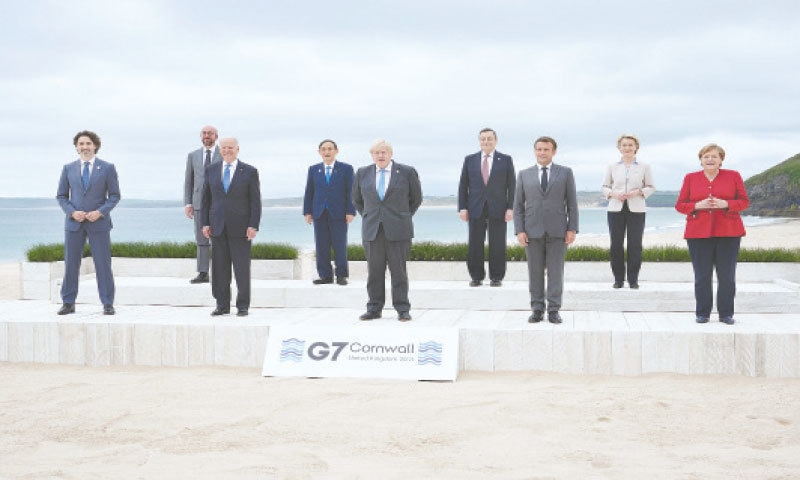CARBIS BAY: Leaders of the G7 countries opened their first in-person talks in nearly two years on Friday, with an expected pledge to donate one billion Covid vaccine doses to poor countries on the agenda in a show of Western democratic cohesion.
The club of leading economies — Britain, Canada, France, Germany, Italy, Japan and United States — say a joint approach is the world’s best chance for recovering from the global health crisis, and tackling climate change.
Welcomed by British Prime Minister Boris Johnson to the beachside summit venue in Carbis Bay, southwest England, the leaders posed for a family photo before opening their first session of talks on “building back better” after the pandemic.
The meeting presents a “huge opportunity” for global pandemic recovery, Johnson told his fellow leaders in opening remarks, as they sat socially distanced and without masks at a round table.
It would focus, he said, on “building back greener, building back fairer and building back more equal”, with an emphasis on gender equality.
US President Joe Biden had set the tone, ditching Donald Trump’s isolationist stance to ram home a message of resolve by the G7 and NATO against both Beijing and Moscow, as he heads into his first sit-down with Russian President Vladimir Putin next week in Geneva.
“I’m looking forward to reinforcing our commitment to multilateralism and working with our allies and partners to build a more fair and inclusive global economy,” Biden tweeted from the G7 in Cornwall.
Covid and climate
Campaigners say the G7’s vaccine donations pledge for this year and next — including 500 million US doses — is far too little, too late to end a pandemic that has claimed over 3.7 million lives worldwide.
“If the best G7 leaders can manage is to donate one billion vaccine doses then this summit will have been a failure,” Oxfam said, insisting the world needs 11 billion doses.
But the G7 wants to rise to competing “vaccine diplomacy” efforts launched by China and Russia, with the Biden administration stressing it expects nothing in return for its donated jabs.
The leaders are also expected to outline more help for developing nations to build up infrastructure, as a counterpoint to the debt-fuelled spending by China in Africa, Asia and Latin America.
The initiative “will embrace a high standards, transparent, climate friendly, non-corrupt mechanism” for infrastructure investment in the developing world, a senior US official said.
“It will be an alternative to that which other countries, including China, are offering.”
‘Indestructible relationship’
Underpinning the US-led diplomatic revival, Biden and Johnson on Thursday adopted a new “Atlantic Charter”, modelled on the pact signed by their World War II predecessors to help build a new world order.
Johnson dislikes the decades-old phrase “special relationship”, arguing it makes Britain look subservient to Washington, telling the BBC instead that it should be viewed as “indestructible”.
